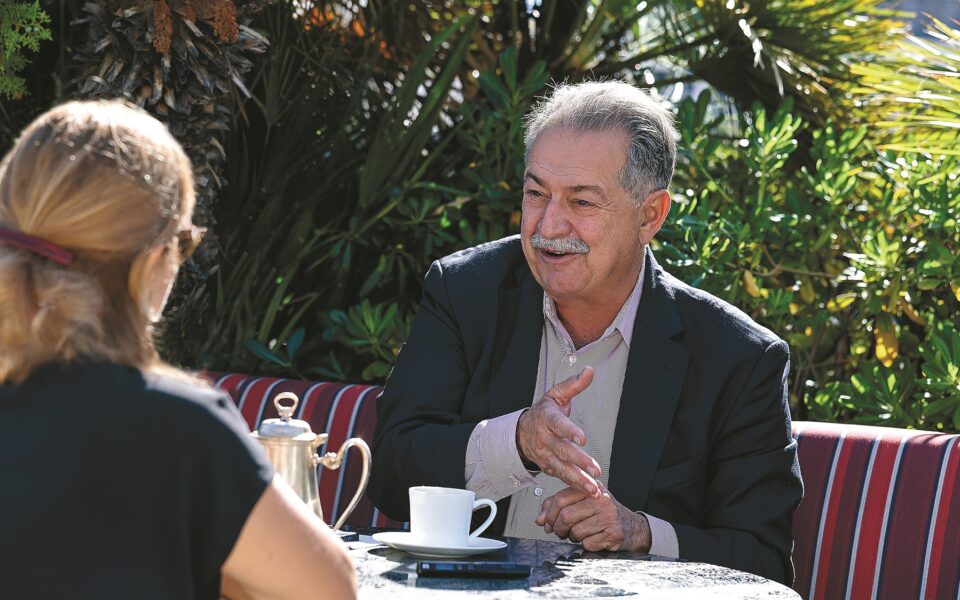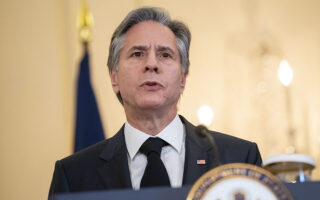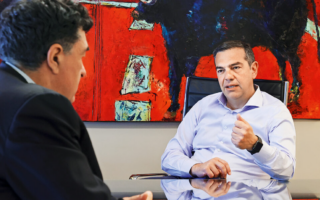Leadership tips from a successful ‘survivor’
Greek-Australian, chairman of The Hellenic Initiative, on his roots, conquering corporate America, and the need for vision

I first met Andrew Liveris in 2012 in Florida, at the most significant annual meeting of prominent Greek Americans of the Leadership 100 organization, which had been founded by Archbishop Iakovos. It was during the peak of the Greek economic crisis and the forecast was grim. The disappointment felt by some about developments in the country of their forebears was palpable in the big hall of the Ritz-Carlton in Palm Beach. But the keynote speaker, Andrew Liveris, the Greek-Australian CEO of Dow Chemical for 14 years, raised the banners. “If not now, then when will we stand by the crisis-hit people’s side?” he asked, challenging the prevailing sentiment at the conference, which was that Greece was beyond redemption. Liveris disagreed and, together with other influential members of the diaspora – such as George Stamas – went on to establish The Hellenic Initiative (THI), a pioneering fundraising initiative.
A lot had changed by the time I met Liveris again last week in Athens. Greece has recovered and is looking at the future with optimism. In those 11 years, THI managed to collect more than $250 million that was delivered to Greece, exclusively, in the form of 250 different donations to areas stretching from healthcare and wildfire prevention to – most recently – boosting startups. It is also active in helping Greece reverse the brain drain by generating more than 4,000 jobs.
Apart from influence, Liveris has also brought prestige to the effort. It is not just the impressive resume of the man who started working at Dow in 1976 and became the chemical giant’s CEO of 14 years in 2004. He also served as adviser to US presidents Bill Clinton, Barack Obama and Donald Trump, as well as to Saudi Crown Prince Mohammed bin Salman. Not to mention that he is now president of the committee handling Brisbane’s bid for the 2032 Olympic Games.
‘Maybe it’s my ancestry from an island as small as Kastellorizo, where people managed to survive with nothing, and even to excel’
Speaking to Kathimerini, Liveris notes that the time has come for a new leadership model. With so many challenges to deal with – from climate change and the advent of artificial intelligence, to growing inequalities – he says that humanity can only progress by inclusion and, most importantly, with future generations in mind.
It is a surprisingly grounded approach from someone with his impressive credentials. “Maybe it’s my ancestry from an island as small as Kastellorizo, where people managed to survive with nothing, and even to excel. Such a tiny place, it passed through the hands of so many conquerors, experienced incredible hardship, yet it survived,” says Liveris, whose father came from Kastellorizo and his mother from nearby Rhodes, both in the southeastern Aegean.
“Or maybe it’s my family. My grandfather left for Australia without shoes on his feet. He died young. My father died when I was just 14 years old, so I became the man of the house. I was a good student and secured scholarships to study chemical engineering. I also helped my mother financially. Perhaps it also has to do with my overall philosophy,” he says, explaining that he discusses this philosophy in his new book after “Make it in America,” “Leading Through Disruption,” which is coming out in the United States next month.
The world, says Liveris, is experiencing tectonic changes in geopolitics, technology, society and the climate, and people, especially the young, “want change, and they want it now.”
“The models of governance developed in the 20th century no longer work in the 21st. My book focuses on how we should combine bringing results in the short term with a long-term vision. But can we lead the younger generations, who are experiencing so much disappointment in democracy, capitalism and digital technology? We only can if we listen to everyone and each person separately, if we make the time, if we are committed to listening instead of just speaking, if we hear their needs, their fears and disappointments. That is the only way to find a solution that is effective, lasting and serves the common good,” Liveris insists.
How popular is this point of view? “I am part of an institution founded by Richard Branson with 30 international figures who believe the exact same thing about future leadership models – about how a leader needs to be effective, but mainly humble. I gained respect in the States for the fact that I paid equal attention to everyone in the company, from the powerful clients and shareholders, to the managers, the cleaners and the security guards. Everyone has something to teach you, as long as you treat them with real respect and trust; not because you are in a position of power and want to appear magnanimous, but because you sincerely believe that they have something valuable to say. Someone may not have the education, but they see life from a different angle, so it is only by combining all these different angles that you can get the proper approach,” Liveris says.
Making room for the future protagonists
As a chemical engineer, Liveris believes that there’s a solution to every problem, as long as you understand its “chemistry.”
“A lack of courage is one of the biggest failings of today’s leadership. Instead of accepting criticism, most leaders tend to see it as a personal affront and turn their back on the important knowledge it has to give them. This is no way to reinvent yourself, your company, your country or your community. Take Greece, for example. I may believe that this or that reform is the key to its success, but if I don’t convince the Greek people that my choices will benefit the whole and each person individually, then nothing will get done. It’s like they say: Mindset trumps strategy. Therefore, if we want to get ahead, we can’t speak in vague terms and we need to spell out the future benefits. That takes skill, time, dedication and a holistic approach to society.”
How does Liveris see Greece right now, and what would he advise the next prime minister?
Kyriakos Mitsotakis, he says of the former prime minister and front-runner for the June 25 ballot, “succeeded because he chose the right model, the one that brings together the values and ethics needed in the 21st century with the economic practices of the 21st century,” he says.
“That is a balancing act that can only be achieved by the center. The far-right can’t do it because it is authoritarian. It believes, ‘If something is good for me, then who cares about everyone else?’ The far-left can’t do it either because it believes in socialist ideas that sound good but are often impractical. Mitsotakis was able to take an economy in recession and bring it back to growth, to attract investors. This new promise is evident in Athens itself,” adds Liveris.
As for how he sees Greece today, he says that “on the one hand, there’s an economic rebirth at a premature phase right now, and, on the other, there’s a triangle between the government, civil society and business. The solutions to its social problems will come when all three sides of the triangle work together. A business can only succeed in this day and age by having a clear view of the reality in society – poverty, lack of equal opportunities, prospects for growth etc – but also from working together with the government, which, in turn, needs to set some ground rules for its operation, a framework. Businesspeople who made money with a 20th-century mindset and methods will go bankrupt if they turn their back on what’s happening around them. But young people, the future protagonists, also need to play a part,” he says.
Liveris says that he understands young people’s anger at a lot of what is going on, but stresses that they need to find a way to get their voice heard by those doing the decision-making. “Many young people say, ‘Impossible!’ But Greta Thunberg did it when she was just a teenager. Today’s world offers such platforms. The issue is for the young generation not to shout, but to be part of the problem-solving process. And the right solution will come when everyone sits down at the table and no one is left out. As for future leaders, their role will be to take all the different points of view into consideration.”





